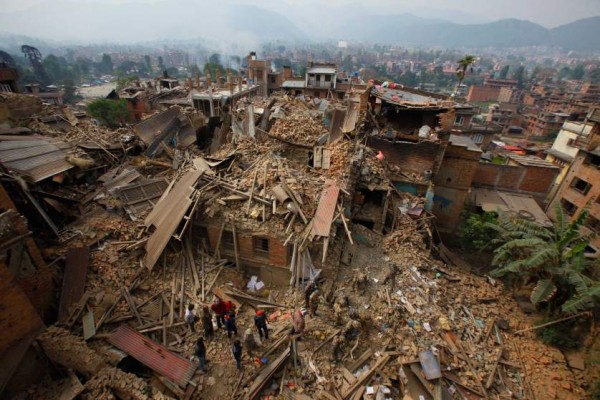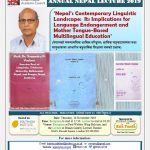News Britain - Nepal Academic Council › News
Latest News
FINAL Conference Programme: BNAC Nepal Study Days, 24-25 April 2025FINAL Conference Programme: BNAC Nepal Study Days, 24-25 April 2025 The final conference programme o...
Read MoreNepal Earthquake- BNAC Issues a Statement
April 30, 2015On 25 April 2015 a huge earthquake measuring 7.8 on the Richter scale hit hard several parts of Nepal including the Kathmandu Valley, where the capital of Nepal is located. Aftershocks continued for days. Thousands of people have died, many more have been injured, hundreds of thousands of houses have either collapsed or are badly damaged, creating an unprecedented humanitarian crisis in Nepal. Losses include unknown numbers of livestock in the hilly districts of the Central and Western Regions and the collapse of centuries-old historical monuments and temples, mainly in the Kathmandu Valley. The international community has joined the Government of Nepal and local communities in an effort to deliver rescue and relief as promptly and effectively as possible. Several organizations and individuals are raising funds and other relief materials.
In this context the Britain-Nepal Academic Council (BNAC) has issued a statement to express its deepest sympathy for the Nepali people at this tragic time and to stress some important points that could be useful for the effective management of the crisis. The full text is as follows:

- Photo credit: unknown (internet)
29th April 2015
Statement on the Nepal Earthquake of Saturday 25th April 2015
The Executive Committee of the Britain-Nepal Academic Council (BNAC), which consists of academics from the universities of Durham, Edinburgh, Leeds, Limerick, London, and Oxford, and from the Centre for Nepal Studies UK, three of whom were born in Nepal and all of whom have spent long periods in the country, wish to express their deepest sympathy for the Nepali people at this tragic time.
The scale of the humanitarian crisis in the Kathmandu Valley and in the districts to its north, is overwhelming: thousands have died, many more have been crippled, and millions left homeless and destitute. We wish to stress the following:
- Unseasonable rain is hampering efforts and the monsoon will arrive soon; relief needs to be brought to remote areas as fast as possible.
- Enormous amounts of aid will be pouring into the country, both from big international organizations and donors and from small individually based initiatives. There is both opportunity here, to rebuild in a sustainable earthquake-resilient way, and danger. We should participate in helping to learn the lessons, particularly salient in the cases of the Haiti earthquake and the tsunami in Sri Lanka and Southeast Asia, of too much aid, or unnecessary aid, badly administered.
- It is conventional and all too easy to denigrate the Nepalese state. But it will need strengthening and help to work better, not undermining or sidelining, in the days to come.
- Having said that, the Government of Nepal does need to take the lead, as only it can, in coordination and in insisting on cooperation from powerful donors and the private sector (e.g. the owners of helicopters deployed on Everest). The Government of Nepal not only needs to take the lead, it needs to be seen to do so.
- There also needs to be coordination (but not control) of the many small-scale and more person-to-person, community-to-community initiatives for both relief and reconstruction that are already under way and which will continue to be important long after the big relief organizations have departed.
- All relief and reconstruction efforts – whether from government, donors, INGOs, private initiatives, or any other quarter – need to be transparent and accountable for the way they disburse the resources they have. They must not only be transparent and accountable, they must also – given two decades of accumulated suspicion of politicians, aid agencies, and NGOs – be seen to be so.
- We salute the resilience and incredible initiative of local people working through mothers’ groups and other local organizations to help each other and those most afflicted. We also salute the young people from afar afield as Janakpur and Delhi who have decided to do something, collected materials, hired a bus, and set off for Gorkha, Sindhupalchok, and other districts, to provide relief.
- For those based overseas, the received wisdom of those with much experience of disaster relief is that it is wasteful to collect clothes, blankets, and food and to send them to Nepal; it is far better to give money that can be deployed directly on the ground using local resources by organizations already in place.
- This is not the time for political parties to be scoring points against each other or for recriminations against powerful neighbours.
- The UK initially offered £5 million, but this has since been raised to £15 million. Much more will be needed over the coming years. We hope that UK can continue its long-term investment in social and economic development including primary healthcare and education.
- The heart has been ripped out of the World Heritage Sites in the Kathmandu Valley. Some temples which had only just been restored collapsed. Sustained international efforts and funding will be needed to support Nepali builders, architects, and artisans in restoring these ancient cities.
- We are dismayed at some of the press and media coverage of the disaster which focused on lost Westerners and the situation on Everest, to the exclusion of the sufferings of millions of ordinary Nepalis.
BNAC officers
Professor David Gellner (Chairman) (University of Oxford)
Dr Krishna Adhikari (General Secretary) (University of Oxford and Centre for Nepal Studies UK)
Dr Celayne Heaton-Shrestha (Treasurer)
BNAC Executive Committee members
Dr Ben Campbell (University of Durham)
Professor Anthony Costello (University College London)
Professor Ian Harper (University of Edinburgh)
Dr Sondra Hausner (University of Oxford)
Professor Michael Hutt (School of Oriental and African Studies, London University)
Dr Mara Malagodi (London School of Economics)
Dr Tom Owen-Smith (King’s College, London University)
Dr Judith Pettigrew (University of Limerick)
Dr Jeevan Sharma (University of Edinburgh)
Professor Surya Subedi OBE (University of Leeds)


